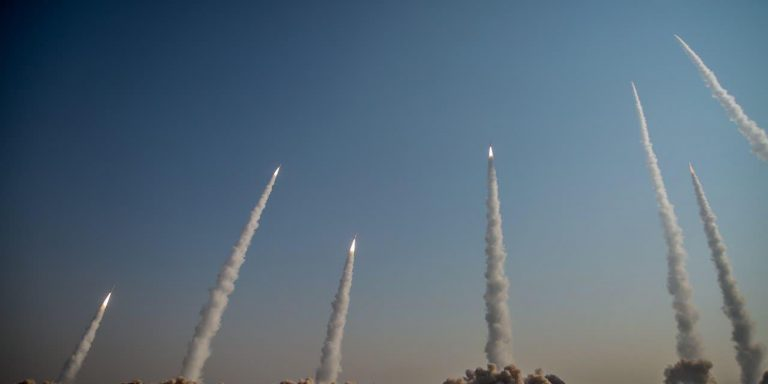
Iran departed from its usual patterns by openly claiming responsibility for a missile strike inside Iraq.
Iran’s Islamic Revolutionary Guard Corps (IRGC) asserted that the attack was in retaliation for a recent deadly strike by Israel on IRGC officers in Syria.
Iran remains committed to driving U.S. forces out of Iraq and exerting preponderant influence there.
The strike might have intended to shape the formation of a new Iraqi government and maximize Tehran’s leverage in ongoing multilateral nuclear talks.
Iran’s Islamic Revolutionary Guard Corps (IRGC) claimed responsibility for firing 12 Fateh-110 missiles on Erbil, capital of the semi-autonomous Kurdistan Region of Iraq, on March 13. The missiles, launched from northeastern Iran, struck targets near the newly-constructed U.S. consulate that, when it is staffed, will serve as the main U.S. diplomatic liaison facility to Iraq’s Kurds. A U.S. State Department official told journalists that most of the missiles hit a private Iraqi Kurdish citizen’s residential compound, later reported by the media to belong to one of the most prominent oil businessmen in the Iraqi Kurdish region. Journalists at a Kurdish television network, Kurdistan24, showed pictures of damage to their facility from the missile strike, indicating that the network had been hit, as well. No significant injuries at any location were reported.
By openly acknowledging Iran’s responsibility for the assault, Iranian leaders left no doubt that the attack was an intentional implementation of Iranian government policy. In so doing, Iranian leaders departed from their past patterns of action in which strikes on Iraqi officials and bases, U.S. military personnel, and other Iraq-based targets were launched by pro-Iranian militias linked to the IRGC’s Qods Force. The use of proxies and allies, in Iraq, Yemen, and elsewhere, gives Tehran a high degree of deniability for attacks that could provoke retaliation from the United States or its regional partners such as Saudi Arabia. To date, the United States has retaliated against Iran-linked militia bases and personnel in Iraq and Syria—but not inside Iran itself.
The true target of the Iranian strike—and Tehran’s intent in launching it—remains opaque. Iran stated that it targeted a facility linked to Israel, retaliating for an Israeli strike in Syria that killed two of its IRGC commanders one week earlier. Iranian Foreign Ministry spokesman Saeed Khatibzadeh, referring to Israel, stated that, “Iran will not tolerate that a center near its borders becomes the center for sabotage, conspiracy and sending terrorist groups to Iran.” Kurdish authorities, however, insisted that Israel has no sites in or near Erbil, and the buildings known to have been struck had no evident connection to Israel or Israelis. If the IRGC believed that it was striking Israel-related facilities, the attack could be seen as a continuation of the undeclared hostilities between Israel and Iran over the past several years. The low-level warfare has manifested as airstrikes, cyberattacks, covert operations, and other assaults on each other’s targets in Syria, Iraq, the Persian Gulf, the Mediterranean, and Iran.
The fact that the missiles hit buildings near the U.S. consulate in Erbil immediately raised the possibility that the strike was a continuation of Iran’s attempts to compel the United States to withdraw its military personnel from Iraq. Iran-backed Iraqi militias have been periodically firing rockets and short-range missiles at bases in Iraq where U.S. and coalition forces advising the Iraqi military are deployed. However, a U.S. State Department official said there was no indication that the target was the consulate building, and Iranian officials and state media did not mention the consulate in their statements on the attack. If Tehran’s intent was to advance its efforts to reduce U.S. influence in Iraq, its message evidently did not resonate in Washington.
Yet, the strike on Erbil coincided with a pause in multilateral talks in Vienna to restore the 2015 Iran nuclear deal—a pause caused by Russia’s insistence on exemption from Ukraine-related sanctions to enable it to benefit economically from the Iran deal. The timing of the missile attack on Erbil suggested that Iran was attempting to exert leverage over the final stages of the talks. Iran wants the United States to agree to include in the deal’s sanctions relief the revocation of the Trump administration’s 2019 designation of the IRGC as a Foreign Terrorist Organization (FTO). Although the IRGC would nonetheless remain heavily sanctioned under other designations, the repeal of the FTO label would represent a symbolic victory for Tehran. On the other hand, Tehran’s calculations in that scenario would be hard to fathom: an IRGC missile attack on a U.S. diplomatic mission might preclude, not facilitate, a U.S. decision to revoke the IRGC’s FTO label.
An alternate theory is that the strike represented an Iranian attempt to shape the outcome of ongoing negotiations on a new Iraqi government. The government formation process, which followed October 2021 national elections, has been stalled for months over disagreement on which Kurdish official would become Iraq’s next president. (By consensus, Iraq’s largely ceremonial presidency is to be held by a Kurd.) Still, no facility used by the autonomous Kurdish regional government, whose capital is Erbil, was hit by the Iranian volley and the missile attack did not have a clear connection to any Iraqi political outcome. Still, Iranian leaders might have assessed that the missile barrage would communicate their insistence that the new Iraqi government include pro-Iranian officials or exclude leaders clearly committed to keeping U.S. troops in Iraq indefinitely. Although the Iranian strike on Erbil clearly departed from Iran’s past patterns of indirect intervention inside Iraq, the missile attack accomplished no clear or realistic Iranian objectives and assessing the attack’s impact might require observation of any Iranian follow-on assaults or any reaction from the possible intended targets of the strike.
